|
|
|
Sort Order |
|
|
|
Items / Page
|
|
|
|
|
|
|
| Srl | Item |
| 1 |
ID:
179257
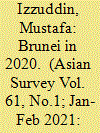

|
|
|
|
|
| Summary/Abstract |
In common with other countries around the world, Brunei Darussalam has had to deal with the coronavirus disease 2019 (Covid19) pandemic and its consequences. By the end of 2020, Brunei had navigated the pandemic storm successfully by keeping its social compact intact, achieving a relatively buoyant economy, exhibiting a balanced foreign policy through strategic hedging, and keeping the country secure through defense diplomacy. Ending 2020 in great shape places Brunei in good stead for assuming the chairmanship of ASEAN and future royal succession.
|
|
|
|
|
|
|
|
|
|
|
|
|
|
|
|
| 2 |
ID:
178215
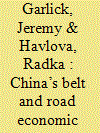

|
|
|
|
|
| Summary/Abstract |
Drawing on the literature on strategic hedging and adapting it to China’s use of economic diplomacy in the service of comprehensive national security goals within the regionalised foreign policy approach of the Belt and Road Initiative (BRI), we examine China’s approach to securing and expanding its interests in the Persian Gulf. To implement the trade and infrastructure connectivity goals of the BRI and to secure the continued flow of diversified energy supplies, China needs to boost relations with both regional powerhouses, Iran and Saudi Arabia, without alienating either of them or the regional hegemon, the United States. The resulting strategy of strategic hedging is based in the Chinese approach to economic diplomacy, which utilises Chinese commercial actors in the service of national strategic objectives. Relations require careful and ongoing management if China is to achieve outcomes which benefit all sides while avoiding becoming entangled in the region’s intractable geopolitical problems.
|
|
|
|
|
|
|
|
|
|
|
|
|
|
|
|
| 3 |
ID:
142158
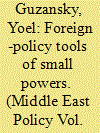

|
|
|
|
|
| Summary/Abstract |
This article analyzes the foreign-policy tools that Kuwait, Qatar, Bahrain, the United Arab Emirates (UAE) and Oman use in dealing with Iran. It argues that a policy of strategic hedging reduces the danger of conflict with Iran in the short term, while preserving contingency plans that address the severity of the threat and the uncertainty of the relationship in the long term. We could have expected that, because of their sense of threat, the small Gulf states would adopt a behavior of balancing Iran's power or, alternatively, of bandwagoning with it. However, these states have consciously chosen to adopt a “mixed” policy that includes elements of both methods. This stands in contrast to the assumption, widespread in the international-relations field, that they would choose to either balance1 or bandwagon as a way of coping with threats.
|
|
|
|
|
|
|
|
|
|
|
|
|
|
|
|
| 4 |
ID:
157702
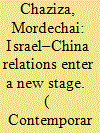

|
|
|
|
|
| Summary/Abstract |
Since the establishment of diplomatic ties between China and Israel in 1992, their relations have warmed up and developed rapidly in diverse areas. This study offers a new theoretical framework, strategic hedging behavior, for analyzing Sino-Israel relations, in order to understand the nature and scope of the hedging relationship between China and Israel. What impact will China’s hedging relationship with Israel have on Washington’s dominance in the Middle East region? The study asserts that this relationship is limited to economics and technology, and China’s relations with Israel cannot replace Israel’s strategic and special relationship with the US. However, the future of the hedging relationship countries is highly sensitive to the evolution of US–China relations in the Middle East and other areas.
|
|
|
|
|
|
|
|
|
|
|
|
|
|
|
|
| 5 |
ID:
177995
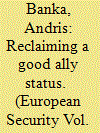

|
|
|
|
|
| Summary/Abstract |
What are the coping strategies of small states at a time when their great power ally questions its security guarantees? Faced with such a scenario, one strand of the literature proposes that small states will seek to establish a reputation of a “good ally” in the eyes of their security patron, thus reducing the likelihood of abandonment. Others, however, maintain that in times of heightened geopolitical uncertainty, small states will attempt to “hedge their bets” by reducing their reliance upon a capricious great power and pursue strategic realignment. The article tests these theoretical assumptions against NATO’s easternmost members: Estonia, Latvia, and Lithuania and their navigation of the “America First” world. The analysis lends evidence that the Baltics have not sought a strategic reorientation away from Washington. Instead, to guard against the possibility of their patron’s defection, they have strived to gain a loyal and trustworthy partner’s reputation by increasing their defence spending and joining the US on a foreign battlefield. The study concludes that these efforts have been primarily geared towards an audience of one: a NATO-sceptic US President.
|
|
|
|
|
|
|
|
|
|
|
|
|
|
|
|
| 6 |
ID:
192486
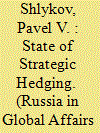

|
|
|
|
|
| Summary/Abstract |
This article analyzes the multidimensional nature of Turkey’s foreign
policy and its relations with Russia in the 2010s and the early 2020s
through the prism of strategic hedging concept. Previously, many scholars
pointed to mostly different elements of balancing in Ankara’s foreign
policy behavior. However, since the late 2010s, Turkey has systematically
positioned itself as a power aspiring for significant strategic autonomy
in international affairs, for which reason researchers had to look for new
analytical approaches to describe its behavior in the international arena and relations with its neighbors. The concept of strategic hedging allows
analyzing more accurately Turkey’s multidirectional foreign policy, which
does not correspond with the classical models of behavior typical of middle
powers, especially those engaged in military-political alliances with the
United States. The article argues that due to a complex of international
and domestic reasons Turkey has been trying to combine different types of
balancing and, more importantly, hedging. This strategy enables Turkey not
only to retain but also to enhance its strategic autonomy in international
relations. In this strategy Russia has become an important source of Turkey’s
strategic autonomy while the crisis in Ukraine, with all its negative impact
on Turkey, has opened up new opportunities.
|
|
|
|
|
|
|
|
|
|
|
|
|
|
|
|
| 7 |
ID:
188366
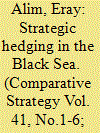

|
|
|
|
|
| Summary/Abstract |
Although strategic hedging has attracted increasing scholarly attention in the study of how secondary states manage their relations with a neighboring great power, existing works on the subject suffer from a serious defect: privileging unit-level variables over structural determinants and security imperatives. The crux of secondary state hedging, however, is to manage the power imbalance against a local great power and security requirements must therefore be considered as the prime determinant behind decisions to embrace hedging strategies. I shall examine this hypothesis against the empirical evidence provided by the case of Turkey and Russia in the Black Sea region.
|
|
|
|
|
|
|
|
|
|
|
|
|
|
|
|
| 8 |
ID:
156241


|
|
|
|
|
| Summary/Abstract |
This article examines the hedging strategies of Iran, Russia, and China. It demonstrates how these deeply dissatisfied states have used strategic hedging to pursue status and security: specifically, through local revisionism that does not jeopardize their ability to participate in the international system or trigger interstate war. The case studies show how these states have maintained this balance during three of the biggest interstate crises of the twenty-first century so far: confrontations over Iran's nuclear program, Russia's destabilization of Ukraine, and China's maritime operations. Each case juxtaposes these states΄ regional assertion of power with their efforts to bargain with the system hegemon. The evidence shows that despite ostensibly revisionist maneuvers, none of these states want to fight the US or to break with the global system. Rather, each has executed its revisionist gambits as part of a wider hedging strategy, calibrating their level of aggression to the tolerance of the US.
|
|
|
|
|
|
|
|
|
|
|
|
|
|
|
|
|
|
|
|
|